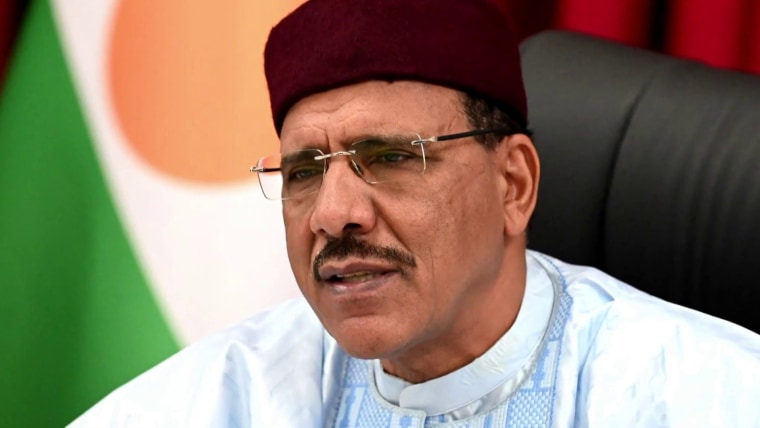At first, U.S. diplomatic and military officials insisted the cause was a personal dispute between the president and the head of his Presidential Guard, Gen. Abdourahamane Tchiani, and that it could be resolved quickly. Tchiani had allegedly taken Bazoum hostage because he expected Bazoum to fire him.
“In the first day, we were told by all of our contacts that nobody supported this,” a senior State Department official said 48 hours after the coup began. “And then in the second day it seemed to balloon a little bit, but those who we talked to said they were just acting to make sure that the president and his family weren’t hurt and that there was no conflict among the military or with civilians.”
U.S. military officials believed that the head of the Nigerien Special Forces, Gen. Moussa Salaou Barmou, their close ally, was going along with the other military leaders to keep the peace. They noted that in a video showing the coup leaders on the first day, Barmou was in the back of the group with his head down and his face mostly hidden.
Less than two weeks later, Barmou met with a U.S. delegation in Niamey, led by acting Deputy Secretary of State Victoria Nuland, and expressed support for the coup and delivered a sobering message: If any outside military force tried to interfere in Niger, the coup leaders would kill President Bazoum.
“That was crushing,” said a U.S. military official who has worked with Barmou in recent years. “We were holding out hope with him.”
Not only had Barmou worked with top U.S. military leaders for years, but he was also trained by the U.S. military and attended the prestigious National Defense University in Washington, D.C.
Last week, sitting across from U.S. officials who had come to trust him, Barmou refused to release Bazoum, calling him illegitimate and insisting that the coup leaders had the popular support of the Nigerien people. Nuland later said the conversations were “quite difficult.”
No faction of the army emerged to try to take on the junta, making it difficult for Western governments to respond. There was also no clear, organized opposition group ready to confront the coup leaders.
“That would have been much easier for the U.S. and for France. That did not happen,” said Michael Shurkin, an expert on West Africa who served at the CIA and the National Security Council and is now the president of Shurbros Global Strategies, a consultancy.
“The Sahel is collapsing under the pressure of these jihadist insurgencies. There’s this sort of groping and grasping for solutions, and there’s no easy answers,” Shurkin said.
An ISIS ambush
U.S. troops have trained Nigerien troops for years as allies in the fight against Islamic terrorist groups. In 2013, the U.S. and Niger agreed to allow U.S. troop deployments in the country to support counterterrorism efforts in a noncombat role.
But the U.S. military role there changed after a deadly attack in October 2017. Searching for kidnapped American aid worker Jeff Woodke, U.S. and Nigerien troops were ambushed by a group of Islamic State fighters outside the village of Tongo Tongo. Outmanned and outgunned, four U.S. soldiers and four Nigerien troops were killed, and many more were wounded. (Woodke was released in March after spending six years in captivity.)
It was the deadliest attack against U.S. troops in Africa since the “Black Hawk Down” attack in Somalia in 1993, and it sparked a debate about the U.S. presence in Niger. Since that attack, the rules for troops at outposts in Niger have changed significantly, U.S. military officials said.
“Tongo Tongo still affects military leaders in the region,” a military officer recently deployed to Niger said. “We weren’t allowed to travel more than 15 kilometers from the base for the first few months” because of concerns about safety.
“We were trying to figure out how to make a mission work, but we were seeing and talking to the same people, talking to the same tribes, all the time,” the officer said. Those limitations meant the Americans had only a limited sense of what was happening around them.
A second U.S. military official in the region said: “Tongo Tongo had a chilling effect on how we operate in Niger, and it’s still in the back of military leaders’ minds every time they leave the base.
“We are not able to engage like we would like,” the official added, “but that’s also because we don’t have the resources we need. We don’t have enough, and so our hands are tied.”
A third U.S. defense official said: “The entire National Defense Strategy for the U.S. includes exactly one paragraph about Africa. That tells you how much we prioritize the continent.”
A U.S. national security official said the Biden administration has paid more attention to the region than previous administrations, including being the first to release a strategy for West Africa and sending several senior leaders to that part of the continent, among them Secretary of State Antony Blinken.







